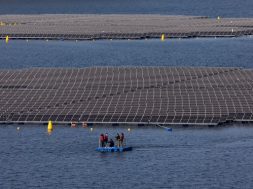
New Delhi: The proposed National Hydrogen Energy Mission for generating hydrogen from green power sources will soon be placed for the Cabinet approval as the document will be finalised this month, the Ministry of New and Renewable Energy said on Tuesday.
In the Budget speech, Finance minister Nirmala Sitharaman had proposed to launch a National Hydrogen Mission for generating hydrogen from green power sources.
She had said, “Prime Minister, while speaking at the 3rd RE-Invest Conference in November 2020, had announced plans to launch a comprehensive National Hydrogen Energy Mission. It is now proposed to launch a Hydrogen Energy Mission in 2021-22 for generating hydrogen from green power sources”.
In a statement issued after a press conference on the Budget proposals for clean energy, the ministry said, “The draft Mission document has already gone through the consultation process and is expected to be finalized in February 2021. Thereafter, it will go through inter-ministerial consultation and Cabinet approval process”.
The roadmap to promote hydrogen is expected to be ready in the next two months.
The mission would put forward a specific strategy for the short term (4 years), and broad strokes principles for long term (10 years and beyond).
The aim is to develop India into a global hub for manufacturing of hydrogen and fuel cells technologies across the value chain.
Towards this end, a framework to support manufacturing via suitable incentives and facilitation aligned with ”Make in India” and ”Atmanirbhar Bharat” will be developed.
It will provide the necessary flexibility to capture benefit from advances taking place in the technology landscape.
The government will facilitate demand creation in identified segments. Possible areas include suitable mandates for use of green hydrogen in the industry such as fertiliser, steel, petrochemicals etc.
Major activities envisaged under the mission include creating volumes and infrastructure; demonstrations in niche applications (including for transport, industry); goal-oriented research & development; facilitative policy support; and putting in place a robust framework for standards and regulations for hydrogen technologies.
About the promotion of domestic manufacturing of solar equipment, the ministry stated that a production linked incentive (PLI) scheme is also announced in the Budget for 2021-22.
The PLI scheme to create manufacturing global champions for an AtmaNirbhar Bharat have been announced for 13 sectors, including manufacturing of ”High-Efficiency Solar PV Modules”.
The government has committed nearly Rs 1.97 lakh crore over 5 years starting 2021-22, including Rs 4,500 crore for ”High-Efficiency Solar PV Modules” – which will be will be implemented by the MNRE.
The PLI schemes will incentivise new Gigawatt (GW) scale solar PV manufacturing facilities in India.
The ministry said that the EFC (expenditure finance committee) meeting for formulating a scheme in this regard has already been held and it will now be taken to the Cabinet for final approval.
The scheme will reward efficiency of solar modules as well as local value addition.
Under the PLI scheme, 10,000 MW capacity of integrated solar PV manufacturing plants (from the manufacturing of wafer-ingot to high-efficiency modules) will be set up by Q4 (January-March 2023) of 2022-23 with the direct investment for around Rs 14,000 crore.
About the imposition of basic customs duty (BCD) on solar equipment to boost domestic manufacturing, the MNRE officials explained that the details about that would come under the phased manufacturing plan for solar cells and panels, which would be notified later.
The finance minister in her budget speech had said, “To build up domestic capacity, we will notify a phased manufacturing plan for solar cells and solar panels”.
The solar energy project developers had urged the government to hold back imposition of BCD for the time being in view of India”s ambitious target of having 175GW of renewable energy by 2022 and limited manufacturing capacity of solar equipment in the country.
About certain reported incidents of cancellation of auctions of clean energy project after issuing a letter of award to developers, the officials explained that they are taking up the issue with the respective states.
However, they admitted that the MNRE could not interfere on a day-to-day basis on these issues as the states are following the standard bidding document for auctioning clean energy projects.
The ministry also lauded the budget announcement about capital augmentation of Solar Energy Corporation of India (SECI) and Indian Renewable Energy Development Agency (IREDA).
It is proposed in the budget to provide an additional capital infusion of Rs 1,000 crore to SECI and Rs 1,500 crore to IREDA.
The cumulative renewable energy capacity installed in the country as on December 31, 2020, is 91,000 MW and further 50,000 MW of the projects are under implementation, of which SECI’s share is 54 per cent.
To give a further boost to the RE sector, an additional capital infusion of Rs 1,000 crore to SECI has been provided which will enable it to float 15,000 MW of tenders on yearly basis.
On yearly basis, it will attract investment of more than Rs 60,000 crore, generate employment of 45,000 job years and reduce emissions of 28.5 million tonnes of CO2 per year.
The capital infusion will also enable the SECI to set up innovative projects of with an investment of around Rs 17,000 crore, the ministry said.
With the equity infusion of Rs 1,500 crore for IREDA, it would be able to extend additional loan facility of Rs 12,000 crore.
This would be in addition to its existing book size of Rs 27,000 crore.
The additional equity will also improve its capital adequacy, which will help IREDA in borrowing at a lower rate of interest, thus lowering the interest rates for developers.
It would also help in the financing of around 4,500 MW of RE projects worth Rs 18,000 to 19,000 crore.
It will generate employment of 13,500 job years and reduce emissions of 8.55 million tonnes of CO2, the ministry said.














